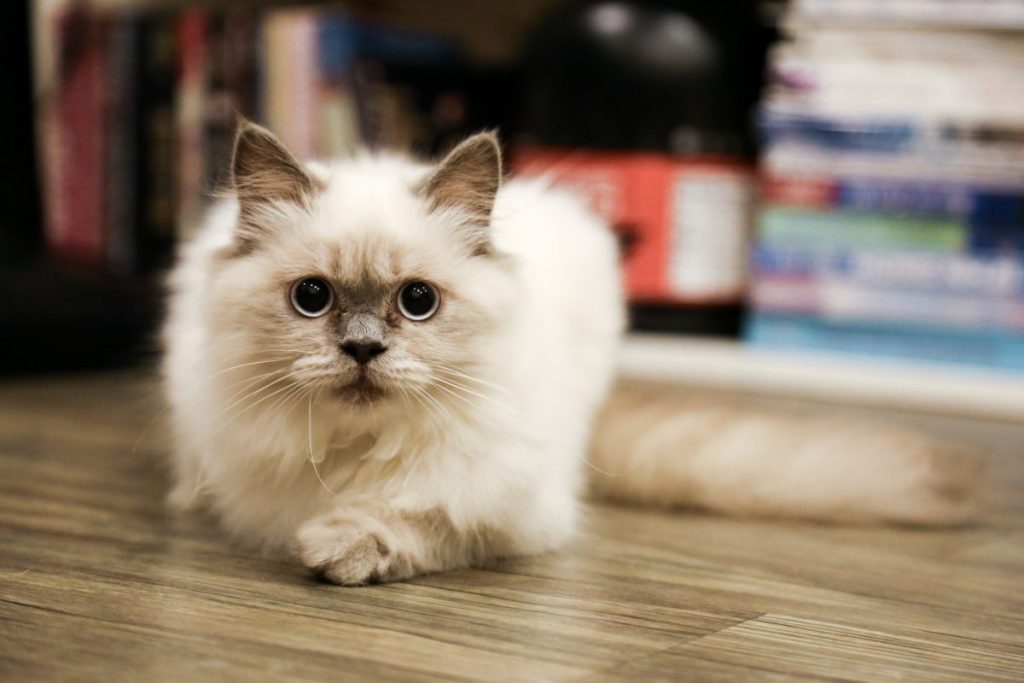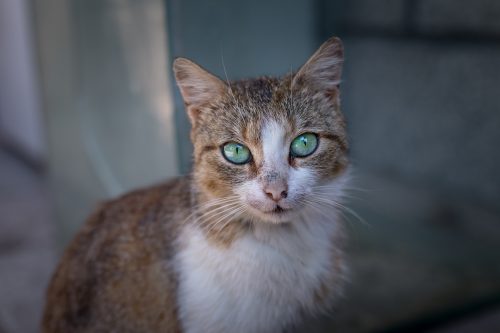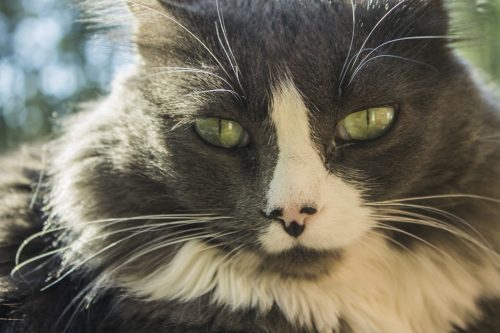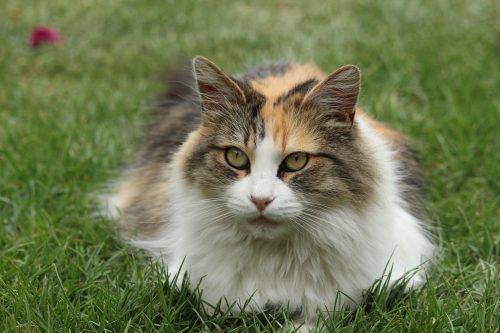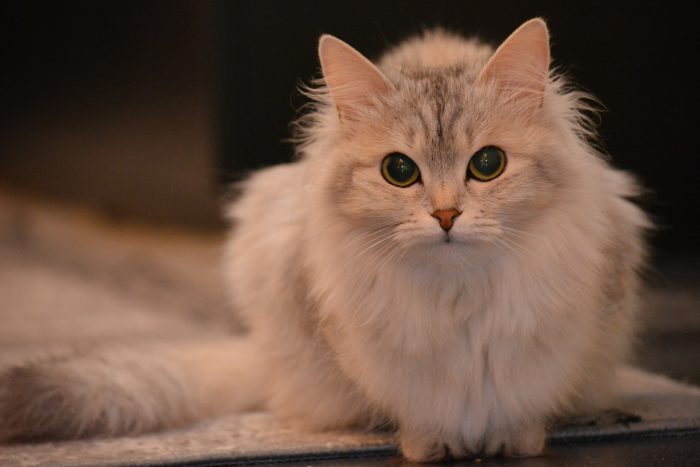Cats are purposeful, quiet, self-sufficient and sometimes clandestine animals. They often seem to appear out of nowhere to jump on the magazine you’re reading, or knock a plant off your table for sport. They show up at your door with a bird they caught as a gift to you, showing off their hunting skills. They seem to need very little from their owners, aside from the occasional back rub and food in their dish.
And knowing their survival skills, they’d find a way to survive without food in the dish. There’s a reason you rarely see feral dogs, but the feral cat population thrives. They’re hardy survivors, seemingly impervious to sickness and disease. That’s why it can be so disconcerting when your cat starts coughing.
Sure, you’ve seen your cat sneeze plenty of times. But it looks much more serious and even violent when your cat goes into a coughing fit. But is it serious? The short answer is, it depends. The medical term for coughing is tussis. And when it’s present, its normally a reaction to an underlying health problem.
Coughing is automatic – like breathing. In fact, it’s one of the most powerful reflexes in your cat’s body, essential to ridding the respiratory tract from foreign particles, including irritants, microbes, and mucus. In essence, coughing is a healthy act.
But it happens because something unhealthy is happening to your cat under the surface. There are various reasons your cat may be coughing a lot. Let’s delve into a few.
Common Causes of Cat Coughing
Tight Collars
Sometimes, it’s as simple as a tight collar restricting your cat’s breathing. This should be the first thing you check when your cat is coughing. If her collar feels tight, loosen it a bit and see if the coughing stops.
Hairballs
Can you imagine if humans coughed up giant balls of hair? Cats do it all the time. Because they eat hair. Not because they enjoy eating hair – they do it out of necessity. Cats groom themselves by licking their fur. Their tongues are like Velcro, pulling hair away with each lick.
The problem is, there’s nowhere to deposit all the hair they pull off themselves, so they end up swallowing it. The hair can irritate the cat’s throat and stomach, and when they have ingested too much hair, they cough it up. The coughing can seem extreme and scary, but it’s actually not coughing at all – it’s vomiting. If your cat is coughing, look to see if anything comes out. If there’s a big ball of hair on the floor when she’s done, you have nothing to worry about.
Allergies
Just like in humans, allergies in cats can cause discomfort in the airways and lungs, leading to sneezing and coughing. When a cat’s immune system becomes sensitive to certain allergens, they develop allergies. There are various types of cat allergies, broken into three groups – flea allergies, environmental allergies and food allergies.
The most common are environmental allergies – similar to those that cause hay fever in humans – and flea allergies. Figuring out what type of allergy your cat suffers from can be tricky. Your vet will perform an extensive examination to determine type of allergy, and the proper treatment.
Asthma
Believe it or not, more than 800,000 cats in America suffer from asthma. It’s the most common respiratory disorder in felines. Asthma occurs when irritants get into your cat’s airways and cause them to shrink, hindering your cat’s ability to breathe.
Cats that spend time outdoors are more likely to develop asthma than those that don’t, but there are several irritants both indoors and out that can cause asthma, including pollen, mold, cat litter dust, cigarette smoke, and perfume.
Stress and obesity can cause asthma as well. If you notice that your cat is coughing for extended periods of time, or is having trouble breathing, take her to a vet immediately. If left untreated, asthma can potentially lead to death.
Fungal Lung Infection
Your cat’s lungs can become inflamed due to a deep infection, called a mycotic infection. A serious mycotic infection can lead to feline pneumonia. This type of pneumonia is not common in cats, but it does happen.
Coughing can be an early sign of fungal infection, but it is usually followed by more severe symptoms like weight loss, fever, discharge from the eyes or nose, and difficulty breathing. Your cat can contract fungi that causes these infections from soil, fecal matter, and bird droppings. To determine if your cat has a fungal infection and pneumonia, your vet will likely perform a skin nodule analysis or biopsy of the lymph node.
If your cat is showing any of these symptoms, make sure to bring her in for treatment. And in the meantime, give her plenty of water and keep her hydrated.
Kennel Cough
Kennel Cough – or Bordetella bronchiseptica – is an upper respiratory tract infection. Though not as common in cats as it is in dogs, Kennel Cough can cause pneumonia in cats. Outbreaks of Kennel Cough occur in laboratory cats and breeding colonies, and can lead to death if not identified and treated early. Antibiotics can be used to treat the disease, and preventative medicine is recommended for kittens.
Heartworms
Heartworms are exactly what they sound like – foot long worms that live inside a cat’s heart, lungs, and veins. These worms, which are spread by mosquitoes, can cause severe lung disease, heart failure, and organ damage. The disease can be fatal if not treated.
The good news is that cats are an atypical host for heartworms. They are much more common in dogs. Most heartworms don’t survive in adult cats, and because there are typically so few actual worms in cats compared to dogs, the disease often goes undiagnosed. Though cats don’t typically die from heartworm, it does cause a condition called Heartworm Associated Respiratory Disease.
Cats suffering from this condition will exhibit asthma-like symptoms and coughing fits. Heartworm disease is a serious, progressive disease. The earlier heartworms are detected, the better the chances your cat will recover. Unfortunately, there are few early signs of the disease. If your cat is coughing regularly, take her to the vet for a heartworm test.
Worms
Heartworms aren’t the only worms that affect a cat’s health. Intestinal parasites, commonly called worms, can wreak havoc on your cat’s body. Roundworms are the most common parasite found in cats. Kittens can contract roundworms from nursing from their mother, and adult cats can contract them from other infected cats, or by ingesting rodent feces.
Hookworms, which live in the small intestines, feed on blood and can cause anemia. Tapeworms, which effect a cat’s appetite and cause vomiting and weight loss, are normally contracted by a cat eating infected insects, like fleas. The worms most likely to cause coughing do not live in the cat’s intestines, but in her lungs. Your cat may contract lungworms by eating birds and rodents. The next time your cat brings you home a bird or a rat as a present, keep an eye on her to make sure she doesn’t develop a cough.
Lung Cancer
The most serious, scary and deadly reason for coughing in cats is, of course, lung cancer. Called Adenocarcinoma, these malignant tumors make up 75% of primary lung tumors in cats. The cancer spreads rapidly and metastasizes to other parts of the body, including the brain, liver, kidney, lymph nodes, bones and eyes. Lung cancer is found mostly in older cats at least 10 years of age.
The symptoms of lung cancer are mostly common symptoms of the respiratory system, including coughing fits. Cats may also suffer from difficulty breathing, rapid breathing, diminished appetite, weight loss, lethargy, fever – and even coughing up blood. The causes of lung cancer in cats are mostly unknown, but it is thought that cats living in urban environments may be more susceptible.
Diagnosing lung cancer in cats is a thorough affair. Your vet will review the entire health history of your cat, perform a physical, and order various lab tests, including a complete blood profile, a chemical blood profile, a complete blood count, and X-ray studies.
Depending on how advanced the cancer is, there are treatment options available, including surgery to remove the tumor, radiation therapy, and chemotherapy. Lung cancer in cats is very aggressive, and most cats live less than one year after being diagnosed.
Preventing Cat Coughing
You can’t prevent coughing in your cat any more than you can prevent sneezing or breathing. It’s natural and it happens for good reasons. But you can take steps to reduce the possibility that your cat will suffer from some of the underlying causes of coughing.
Get Your Cat Tested
It’s a good idea to have your cat tested for internal parasites not only if you suspect something is amiss, but on a yearly basis. Like any health issue, early detection is the key to staying healthy.
Keep the Irritants to a Minimum
Common substances, like perfume, carpet deodorizers, air fresheners, and hairspray can be rough on your cat’s airways. Try to limit your cat’s exposure to these products whenever possible.
Smoking
Smoking makes humans and cats alike cough, sometimes violently. If you do smoke, try not to do it around your cat. Smoke outside, or open a window. Your cat will thank you.
Use a Humidifier
If your cat coughs more when the atmosphere is dry, running a humidifier can help alleviate her symptoms – especially during winter in cold weather climates and year-round in arid, desert climates.
Preventative Heartworm Medication
The best way to avoid heartworms in your cat is to get her preventative medication, especially for kittens. These are standard medications that are recommended for kittens and puppies alike, and are very effective. If you live in an area that has a lot of mosquitoes, the incidence of heartworms is much higher, and preventative medication is often necessary to avoid the disease.
Keep Your Cat at a Healthy Weight
Obesity can cause a rash of health problems in cats – including coughing. Make sure to feed your cat smaller portions of food, and a mix of wet and dry food – no matter how much she begs for more. Consult with your vet to determine the right diet to keep your cat healthy.
Reduce Stress
Like obesity, anxiety in cats can cause poor health and accentuate existing health issues. Creating an environment where your cat feels safe and loved will help ease her stress and improve her health. Make sure she has space to explore, and a safe space to retreat to when she feels like being alone. Of course, lots of petting and love helps too!
Groom Your Cat
A great way to help reduce hairballs is to help your cat with grooming. Brushing your cat just a few times a week will reduce some of the burden on her to remove loose and dead hair, meaning less will end up in her stomach, and eventually on your floor!
Awareness
It may sound simple, but the most effective way to prevent and treat your cat’s cough is by becoming attuned to her personality and health. Unlike dogs, cats can be private and less forthcoming with their feelings – particularly when they are unhealthy. Many cats choose to hide from their owners when dealing with health issues. You may not even notice they’re not around.
Self-sufficiency is a hallmark of cats, but sometimes they need your help – even if they don’t know it. Of course, every cat’s personality is unique. The best thing you can do is pay close attention to your cat. If her behavior seems different, or if she is exhibiting any signs of poor health, including fits of coughing, schedule an appointment with your vet to determine why she is sick, and what can be done to treat her.
Sources:
- “Why Does My Cat Cough So Much?” WebMD, Accessed 19 Mar 2017. www.pets.webmd.com/cats/coughing-cats-causes-feline-coughing#1.
- “Causes and Treatment Option for Chronic Cough in Cats.” Healthy Pets, Accessed 19 Mar 2017. www.healthypets.mercola.com/sites/healthypets/archive/2016/05/17/chronic-cough-cats.aspx.
- “Coughing in Cats – Symptoms, Causes, Diagnosis, Treatment, Recovery, Management, Cost.” WagWalking, 22 Aug. 2016, Accessed 19 Mar 2017. www.wagwalking.com/cat/condition/coughing.
- “Coughing in Cats.” PetMD, Accessed 19 Mar 2017. www.petmd.com/cat/conditions/respiratory/c_ct_cough.
- “Coughing in Cats – Should You Be Concerned?” Vetwest Animal Hospitals, 6 Apr. 2016, Accessed 19 Mar 2017. www.vetwest.com.au/pet-library/coughing-in-cats-should-you-be-concerned.

